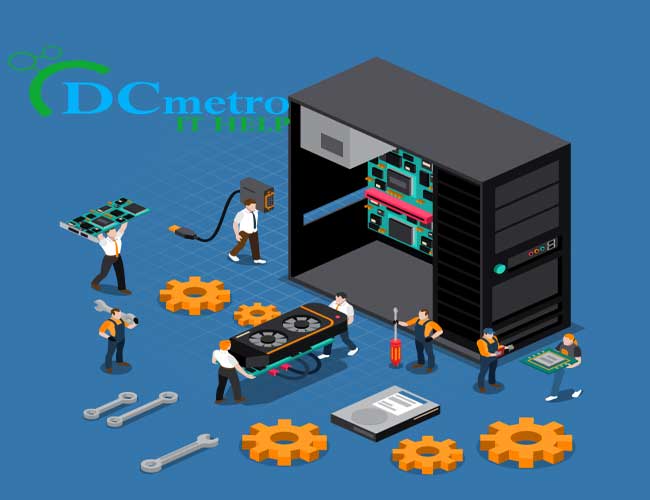In the fast-paced and ever-evolving digital era, computer hardware forms the backbone of our technological infrastructure. From powerful servers to portable devices, hardware technicians play a pivotal role in ensuring the smooth functioning of these vital components. In this article, we will delve into the responsibilities, skills, and value that hardware technicians bring to the table, shedding light on their crucial role in maintaining and optimizing hardware systems.
Contact us 202-810-7755 today to learn more about hardware Technician. Please contact us to get hardware Technician for your business or if you have any questions or concerns.
DC Metro IT Help
The Responsibilities of a Hardware Technician:
Hardware technicians, often known as computer repair technicians or hardware specialists, are responsible for the installation, maintenance, and repair of computer hardware components. Their role encompasses a wide array of responsibilities, including:
- Diagnosis and Troubleshooting: Hardware technicians possess expert knowledge in diagnosing hardware issues. They use specialized tools and techniques to identify problems, analyze symptoms, and determine the root causes of malfunctions.
- Repair and Replacement: Once the issues are identified, hardware technicians perform repairs or replacements of faulty hardware components. This may involve disassembling and reassembling computers, replacing damaged parts, and ensuring proper functionality of the system.
- Hardware Installation and Configuration: Hardware technicians are proficient in installing and configuring various hardware components such as central processing units (CPUs), graphics cards, memory modules, hard drives, and peripheral devices. They ensure compatibility, optimize performance, and troubleshoot any installation-related issues.
- Preventive Maintenance: To minimize the risk of hardware failures, hardware technicians conduct regular maintenance procedures. This includes cleaning components, applying thermal paste, updating firmware, and monitoring system temperatures to prevent overheating.
- Collaboration with Software Technicians: In many cases, hardware and software issues are interconnected. Hardware technicians collaborate with software specialists to resolve conflicts, ensure hardware compatibility, and optimize system performance.
Skills Required:
The role of a hardware technician demands a diverse skill set, combining technical expertise, problem-solving capabilities, and effective communication. Here are some key skills necessary for success in this role:
- Hardware Proficiency: Hardware technicians should possess in-depth knowledge of computer hardware components, their functionalities, and compatibility requirements. They should stay updated with the latest advancements and emerging technologies.
- Troubleshooting Abilities: Strong analytical and problem-solving skills are crucial for diagnosing and resolving hardware issues effectively. Hardware technicians need to apply logical thinking and utilize diagnostic tools to troubleshoot problems efficiently.
- Technical Documentation: Documentation skills are essential for hardware technicians to maintain accurate records of repairs, configurations, and installations. Clear and concise documentation aids in future reference and troubleshooting.
- Communication and Customer Service: Hardware technicians often interact with end-users who may have limited technical knowledge. Strong communication skills help them understand user concerns, explain technical concepts in layman’s terms, and provide excellent customer service.
- Adaptability and Learning Aptitude: As technology evolves rapidly, hardware technicians must possess a willingness to learn and adapt to new hardware advancements. They should be open to upgrading their skills and keeping up with industry trends.
Value in the Digital Era:
Hardware technicians play a crucial role in the digital era, contributing significantly to the stability and optimal performance of computer systems. Here are some key ways in which hardware technicians add value:
- System Reliability: By promptly diagnosing and resolving hardware issues, hardware technicians ensure that computer systems operate reliably and minimize downtime. This leads to increased productivity and user satisfaction.
- Cost Optimization: Hardware technicians help organizations save costs by extending the lifespan of hardware components through regular maintenance, repairs, and upgrades. This reduces the need for frequent replacements and associated expenses.
- Performance Optimization: Through their expertise, hardware technicians optimize system performance by recommending and implementing hardware upgrades, fine-tuning configurations, and resolving compatibility issues. This enhances the overall efficiency and speed of computer systems.
- Future-Proofing: Hardware technicians stay updated with the latest advancements and emerging technologies, enabling them to guide organizations in making informed decisions regarding hardware upgrades and investments. This future-proofing approach ensures long-term viability and scalability.
In the digital era, hardware technicians are the unsung heroes who ensure the smooth functioning of computer hardware systems. Their expertise in diagnosing, repairing, and maintaining hardware components plays a vital role in optimizing system performance, increasing reliability, and reducing costs. As technology continues to advance, the value of hardware technicians remains indispensable, making them essential contributors to the seamless operation of our digital infrastructure.



Leave a Reply